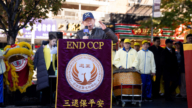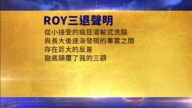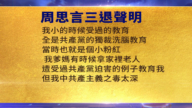【新唐人2011年4月9日訊】最近,有網友比較了海峽兩岸「國民黨」和「中國共產黨」兩黨的入黨誓詞。真是不比不知道,一比嚇一跳。我們現在就來看看到底有什麽不同。
「國民黨」的入黨誓詞有3大段,其中包含有4個「黨」字,16個「國」字,13個「人」字,8個「民」字,除此以外,還有2個「仁」字,2個「道」字,3個「德」字。
而「中國共産黨」入黨誓詞歷經4次變化,但大同小異,都只有一小段,最新版的有12小句,其中有10個「黨」字,1個「國」字,1個「人」字,1個「民」字。「人民」兩字是1982年中共十二大時加上去的,放在「黨」字的後面。「仁、道、德」這幾個字卻沒有在入黨誓詞裡出現。
《希望之聲國際廣播電台》評論員藍述認爲,「國民黨」和「中國共産黨」入黨誓詞有三點根本的區別。
藍述(《希望之聲》評論員):「一點,是國民黨的入黨誓詞強調的是『為民』,出發點是『為民』的,中共的出發點是『爲黨』的;第二點,(國民黨)三民主義的基本理念是人道的理念,而共產黨是共產主義的理念,是完完全全非人道的理念;第三點,國民黨的入黨誓詞,它是中華民族傳統和信天信神正統的思想,而共產主義的信仰是西方社會傳來的非主流的,以撒旦教邪教為信仰的。」
在國民黨入黨誓詞中,提到的「三民主義」指的是「民族主義」、「民權主義」和「民生主義」,是來源於美國總統林肯說的「government of the people, by the people, for the people」,就是民主、民權、民生。
但在「中國共產黨」的入黨誓詞中,在短短的12句話裡面,卻有10句含有黨字,並要「為黨犧牲一切」。「人民」永遠在「黨」的後面。
藍述(《希望之聲》評論員):「中共口裏講的人民,是它所詮釋的人民的黨和人民,人民並沒有投票權,人民並沒有自由表達的權力,它講的為黨和人民,還是為黨。在入黨的第一天起,你就要首先放棄你的人道,你只要執行黨的命令就行了。」
「中國和平民主聯盟」主席唐柏橋認爲,中共的入黨誓詞和黑社會的性質差不多。
唐柏橋(「中國和平民主聯盟」主席):「黑社會社團一般宣誓的話,都有一個誓死效忠,不可以退出,退出後又什麽懲罰。共産黨的誓言,一旦宣誓後你一定要效忠它,然後不怕犧牲,還有就是共産黨的利益,爲共産主義事業奮鬥終身等等。實際都是最強烈的一種對共産黨的宣誓,然後永遠不叛黨等等,這詞都是和黑社會的那種宣誓差不多少。」
唐柏橋認爲,中東、北非地區國家雖然掀起了民主革命浪潮,但這些獨裁執政黨對異己的迫害還有法律程序、有媒體監督。但中國共産黨,包括朝鮮的勞動黨、古巴的共産黨、前蘇聯的蘇聯黨等,都是讓異己從生理上消失,比法西斯還要殘暴。
唐柏橋(「中國和平民主聯盟」主席):「像文化大革命、三反、五反、包括現在對法輪功的鎮壓等等,那都是赤裸裸的大規模的消滅另外一個群體。」
從2004年11月起,《大紀元時報》推出的《九評共產黨》一書,掀起了海內外退出共產黨的熱潮。延續到今天,目前已經有92,704,312 人宣佈退出中共黨、團、隊。
另外,無獨有偶,還有網友比較了美國警察「入警誓詞」和中國大陸警察的「入警誓詞」。中國大陸警察入警誓詞中,警察首先要「保證忠於中國共産黨」。而美國警察入警誓詞中,首先說的是「我最基本的職責是爲公民服務」。
新唐人記者劉惠、黎安安、孫寧採訪報導。
======
Startling Comparison of the oath between CCP and Kuomintang
An interesting comparison has recently been made
By internet users about the difference between CCP
Oath and that of Kuomintang, the result came as a bit
Of a shock, let’s take a quick look at it.
The main text of Kuomintang’s oath comprised of
3 paragraphs, within which there are words of 4 Parties,
16 Nations, 13 People, 8 Citizens, plus there
are 2 Benevolence, 2 Justice and 3 Moralities.
The text of CCP, though revised 4 times, changed
Little. With only one small paragraph, the Oath was
given out in 12 sentences, where there are 10 Parties,
1 Nation, 1 People, 1 Citizen. The Characters
Of People and Citizen were only added after
The 12th National People’s Congress, coming in after
The Party. Words such as Benevolence, Justice and
Moralities are thoroughly absent.
The commentator of Sound of Hope Radio Lan Shu
Suggested that there were 3 fundamental differences.
Lan Shu: First, the oath of Kuomintang
Is based on the people’s interest, but CCPs based on
The interest of the party; second, Kuomintang has
Conveyed In its Three People’s Principles
the philosophy of humanity, CCP however,
the philosophy of party; third, KMT’s Oath
is delivered with the traditional Chinese faith,
Whereas CCP, introduced from the non-classic of
western World, is in the belief of devil.
In the text of Kuomintang’s oath,
Three People’s Principles Has been mentioned
which means nationalism, Democratic and
Principle of Livelihood, interpreted
From Lincoln, the US present, about “government of
the people, by the people, for the people”.
In the text of CCP’s oath, however, 10 out of 12 sentences
Have got the Party in it, and the Absolute Sacrifice For
The Party. What’s obvious is that People should always
come after the Party.
Lan Shu: CCP has implied that by people,
it means people of the party, ordinary citizens however
Do not have the right to vote or to speak freely.
It’s ultimately in the interest of the party, though it
Claimed that is for people. From the first day
one joined The CCP, one had to give up his humanity,
only to Follow orders.
Tang Baiqiao , the president of League of Peace and
Democracy in China, suggested that the oath of CCP
Bore a striking resemblance to that of the gangland.
Tang Baiqiao: In criminal organizations,
there is often a swear of allegiance and once joined,
one can hardly withdraw, for punishment would come
afterwards. CCP called for a total allegiance from its
members, to abandon any fear of death. Also, its principle
requires one to devote a life long of commitment.
It’s nothing different from an evil vow, for which one
has ever made should then never betray, it’s just evil.
Tang also suggested that in those democratic revolutions
Taking place in the Middle East and North Africa,
The crackdown of rulers were mostly subjected to law
Procedures and media scrutiny. CCP however, as
Well as the Labor Party in Korea, the Communist Party
In Cuba and Soviet Union, was to extinguish the
Dissident by any means necessary, much more brutal
Than the fascist.
Tang Baiqiao: [Recording] Examples such as the Great
Cultural Revolution, the Three anti-campaign, Five
Anti-campaign and current repression on Fa lun gong,
Are just flagrantly crackdowns against the dissident
In large scales.
The Epoch Times has released a book of
Nine Comments On CCP in Dec 2004, resulting in a
wave of withdraw from CCP membership. So far there
has been 92,704,312 people quitting from CCP
organizations.
What’s more, in the comparison of police oath between
CCP and United State, the initial requirement for the
Former has been to be loyal to the CCP; the latter, the
Service to the citizens.
NTD reporters Liu Hui ,Li Anan and Sun Ning




























